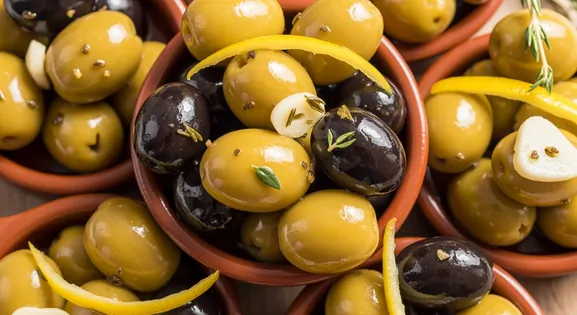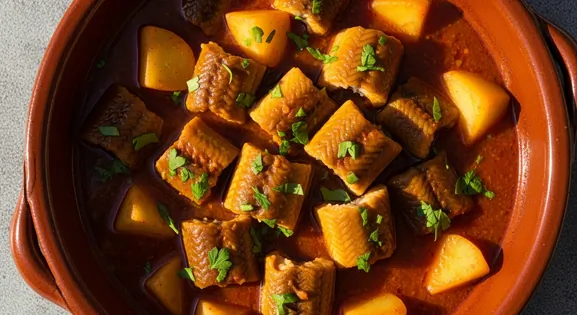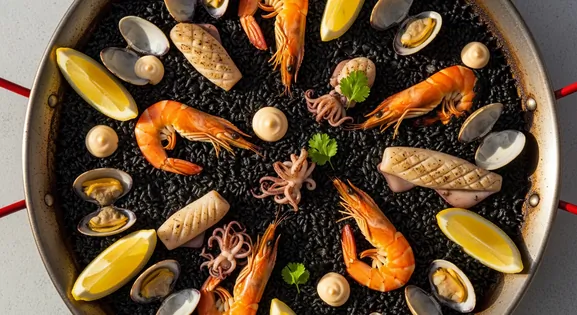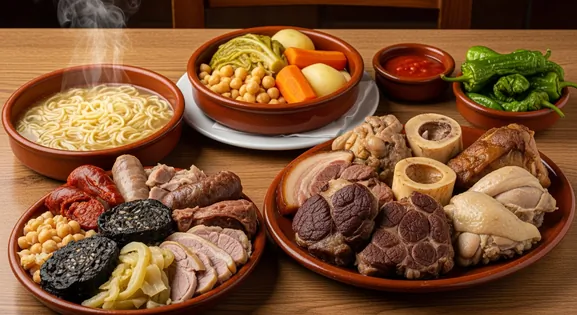Arroz del Senyoret in Spain: A Complete Food Lover's Guide
Arròs del Senyoret (Valencian) / Arroz del Señorito (Spanish)
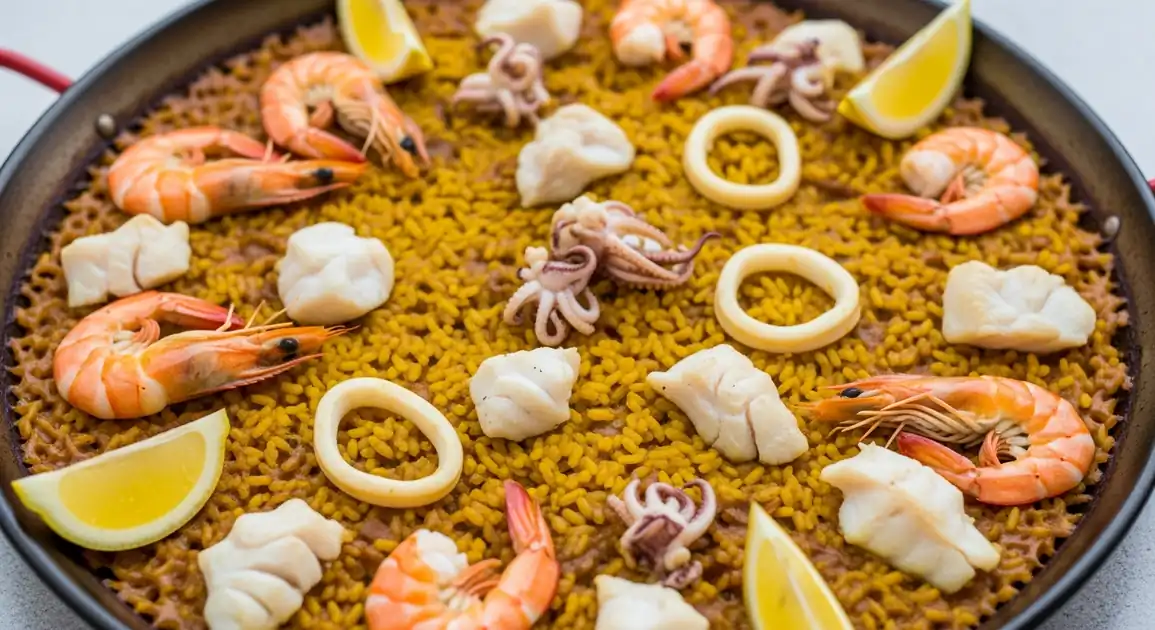
A Culinary Snapshot
Arroz del Senyoret, translating to 'Gentleman's Rice' or 'Young Master's Rice', is a refined seafood rice dish originating from the Valencian Community in Spain. Cooked in a traditional paella pan, its defining feature is that all seafood ingredients – typically shrimp, squid, and monkfish – are served peeled and de-boned, ready to be eaten conveniently without fuss. Infused with saffron and rich seafood broth, it offers intense flavor in an elegant, easy-to-eat format.
A Traveler's Guide to Authenticity
What to Look For
-
Served freshly cooked and hot
Rice dishes should be cooked to order and served hot to ensure optimal quality and consumption.
-
Fresh smelling and tasting seafood
Shrimp, squid, and fish should smell clean and taste fresh, with no hint of ammonia or 'off' flavors.
-
Reputable 'Arrocería' or Restaurant
Choose establishments known for their rice dishes and good hygiene standards.
-
Properly cooked rice
Rice should be cooked through ('al dente' or slightly softer is common) but not mushy.
What to avoid
-
Seafood that smells or tastes bad
Strong indication of spoilage; best to avoid consumption.
-
Dishes served lukewarm
Suggests it wasn't freshly prepared or held correctly, impacting quality.
-
Establishments with poor cleanliness
Avoid places with visible hygiene issues, as this can compromise food quality and lead to potential issues.
-
Mushy or undercooked rice
Indicates poor preparation, though less critical for quality than spoiled seafood.
How to Order Arroz del Senyoret (Gentleman's Rice)
What to Serve with This Dish
Dry White Wine
Wine
A crisp, dry white wine like a Verdejo or Albariño from Spain complements the seafood flavors without overpowering them, offering a refreshing contrast.
Light Salad
Side Dish
A simple, fresh green salad with a light vinaigrette provides a refreshing counterpoint to the richness of the rice dish, cleansing the palate.
Explore Arroz del Senyoret (Gentleman's Rice) in Detail: City Guides
Discover where to find the best Arroz del Senyoret (Gentleman's Rice) and learn local tips in these cities:
Tracing the Roots of Arroz del Senyoret (Gentleman's Rice)
Legend attributes the dish's creation to Valencian restaurants catering to impatient or 'lazy' upper-class diners ('señoritos') who didn't want the hassle of peeling shrimp or de-boning fish at the table. It evolved as a variation of 'Arroz a Banda' (rice cooked separately in fish broth, served after the fish) or Seafood Paella, prioritizing convenience while retaining the deep seafood flavors derived from a potent broth made using the shells and fish bones that are later discarded.
How It Is Traditionally Made
Arroz del Senyoret starts with a flavorful seafood broth ('fumet') made by simmering fish bones, shrimp shells/heads, and vegetables. A 'sofrito' base is prepared in the paella pan with olive oil, garlic, chopped tomatoes, and often paprika. Bite-sized pieces of boneless fish (like monkfish) and chopped squid/cuttlefish are sautéed in the sofrito. Peeled shrimp are added briefly. Rice (typically Spanish bomba or senia varieties) is added and toasted, followed by saffron threads and the hot seafood broth. The mixture is simmered without stirring until the rice absorbs the liquid and is cooked through, ideally forming a crispy 'socarrat' layer at the bottom. The dish rests for a few minutes before serving.
Key Ingredients of Arroz del Senyoret (Gentleman's Rice)
Bomba or Senia Rice
These short-grain Spanish rice varieties are crucial for absorbing the rich seafood broth without becoming mushy, while maintaining their distinct grain structure.
Quality indicator: Look for plump, pearly grains that absorb liquid evenly and don't clump. Quality rice is essential for texture.
Fresh Seafood (Peeled Shrimp, Squid, Monkfish)
The defining feature of Senyoret is the convenience of pre-peeled shrimp, de-boned squid, and boneless white fish chunks, ensuring a hassle-free eating experience.
Quality indicator: Seafood should be firm, translucent, and have a fresh, oceanic scent, never fishy. Prioritize restaurants with high seafood turnover.
Saffron
This prized spice imparts the characteristic golden color and a subtle, earthy aroma to the rice, elevating the dish's flavor profile.
Quality indicator: Authentic saffron threads are deep red with orange tips; avoid powdered saffron or threads that look dull or too uniform, which might indicate artificial coloring.
Local Arroz del Senyoret (Gentleman's Rice) Variations in Spain
Specific Seafood Used
The exact types of white fish (monkfish, hake, cod) or squid (calamar, sepia) can vary based on availability and restaurant choice.
Broth Intensity
The richness and depth of the seafood broth ('fumet') can differ significantly between restaurants.
Presence/Amount of Socarrat
Achieving the desired crispy bottom layer ('socarrat') varies; some restaurants excel at it more than others.
Related Dish: Arroz a Banda
Very similar flavor base, but traditionally the rice (cooked in fish broth) is served separately *after* the fish and potatoes used to make the broth have been eaten.
Dietary Information
Dietary Information
Important Note for Travelers: Your safety is our priority. Below are the common allergens associated with the traditional preparation of this dish. However, recipes and ingredients can vary significantly between establishments. Always confirm all ingredients directly with the food vendor before ordering, especially if you have a severe allergy.
Potential Allergens
Dietary Suitability
Frequently Asked Questions about Arroz del Senyoret (Gentleman's Rice)
What is Arroz del Senyoret?
Arroz del Senyoret (or 'Arròs del Senyoret' in Valencian) translates to 'Gentleman's Rice' or 'Young Master's Rice'. It's a seafood rice dish from the Valencia region of Spain, similar to paella but with a key difference: all the seafood (typically shrimp, squid, monkfish) is peeled and de-boned before cooking. This allows the diner to eat it without getting their hands dirty – hence the 'gentleman's' name.
How is Arroz del Senyoret different from Paella?
Unlike traditional Seafood Paella, Arroz del Senyoret exclusively uses pre-peeled shellfish and boneless fish, making it easier to eat. While both are cooked in a paella pan with saffron rice and seafood broth, Senyoret prioritizes convenience, often being served after the fish used for the broth, similar to 'Arroz a Banda'.
What does Arroz del Senyoret taste like?
It has a rich seafood flavor infused into the saffron rice from a potent fish/shellfish broth ('fumet'). The taste features the sweetness of shrimp, tender squid, and mild fish, combined with the savory rice, often with hints of garlic, paprika, and tomato sofrito. A good version might have a slightly crispy bottom layer called 'socarrat'.
How can I ensure a quality experience with Arroz del Senyoret?
Yes, it's generally a reliable choice when prepared in reputable restaurants. The rice and seafood are thoroughly cooked. To ensure a quality experience, choose clean establishments known for good rice dishes, ensure seafood smells fresh, and the dish is served hot from the pan.
What seafood is typically included?
Common ingredients include peeled shrimp ('gambas peladas'), chopped squid or cuttlefish ('calamar' or 'sepia'), and chunks of boneless white fish like monkfish ('rape') or hake ('merluza'). The exact combination can vary.
Is Arroz del Senyoret gluten-free?
Traditional Arroz del Senyoret should be gluten-free, as its main components are rice, seafood, broth, vegetables, saffron, and olive oil. However, cross-contamination in the kitchen is possible, and some broths ('fumet') or sofritos could potentially use flour (though uncommon for this dish). Always confirm with the restaurant if strict gluten avoidance is necessary.
Is Arroz del Senyoret vegetarian or vegan?
No, Arroz del Senyoret is fundamentally a seafood dish. It contains various types of fish and shellfish, including shrimp, squid, and monkfish, making it unsuitable for both vegetarian and vegan diets.
Expert How-To Guides about Arroz del Senyoret (Gentleman's Rice)
How to Identify Authentic Arroz del Senyoret
Learn to recognize the essential characteristics of a truly authentic Arroz del Senyoret, ensuring a high-quality and traditional culinary experience.
- Confirm peeled seafood: The defining characteristic – all shrimp must be peeled, all fish boneless, no shells (mussels, clams) present.
- Check the pan: Should be served in a wide, shallow paella pan.
- Assess the rice: Look for saffron-colored rice cooked in a thin layer, ideally with some slightly caramelized 'socarrat' at the bottom (ask!).
- Note the ingredients: Expect shrimp, squid/cuttlefish, and white fish pieces evenly distributed.
- Distinguish from Paella: Ensure it doesn't contain unpeeled prawns, mussels in shells, langoustines, chicken, or rabbit (which belong in other paella types).
Ordering and Eating Arroz del Senyoret
Master the art of ordering and enjoying Arroz del Senyoret, from understanding portion sizes to savoring every last bite of this delicious Spanish specialty.
- Check minimum order: Often made for a minimum of two people; confirm when ordering.
- Allow preparation time: Authentic rice dishes are cooked to order and take time (usually 20-30 minutes).
- Squeeze lemon (optional): Lemon wedges are often served; a light squeeze can brighten the flavors.
- Scrape the 'socarrat' (optional but recommended): If present, the slightly crispy, caramelized rice layer at the bottom of the pan is highly prized. Gently scrape it up.
- Use a fork: Eaten with a fork directly from the pan (if sharing) or served onto individual plates.
Finding the Best Arroz del Senyoret
Discover how to identify and locate the best restaurants and 'arrocerías' across Spain that serve exceptional, authentic Arroz del Senyoret.
- Look for 'Arrocerías': Restaurants specializing in rice dishes are often the best bet.
- Choose places popular with locals: Busy spots favored by locals usually indicate authentic quality.
- Read reviews: Check online reviews focusing on rice dishes.
- Ask for recommendations: Hotel concierges or local guides can suggest reputable arrocerías.
- Prioritize fresh seafood: Restaurants known for quality seafood are likely to make a better Senyoret.
Our Commitment to Quality
At Tasteplorers, our mission is to provide the most accurate and useful travel information in the world. To achieve this, all content on this site is created through our unique editorial framework. We utilize leading AI research tools, guided by our proprietary prompts, and a multi-stage validation process. This entire system is overseen by our editorial team to ensure everything we publish meets our high standards for accuracy, cultural nuance, and practical value for travelers.
Learn more about our Editorial Process and our Mission.
Countries
Explore regions
Europe
Discover Europe's diverse culinary landscape, from Mediterranean flavors to hearty Alpine fare. Learn to navigate markets, decode menus, and eat like a local.
Latin America & Caribbean
Discover the vibrant cuisines of Latin America & the Caribbean. Our expert guide covers everything from Mexican street food to Peruvian ceviche and market tips.
Oceania
Explore Oceania's diverse food scene. Learn about Polynesian earth ovens, Fijian feasts, and the vibrant café culture of Australia and New Zealand.
Southeast Asia
Explore Southeast Asia's diverse food cultures from Thailand to Vietnam. Get expert tips on navigating spice levels, choosing quality vendors, and understanding the rich traditions of the region.
